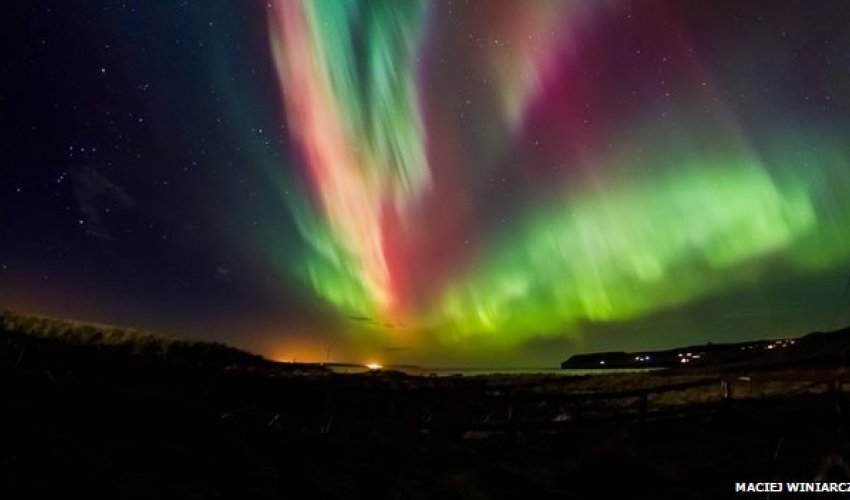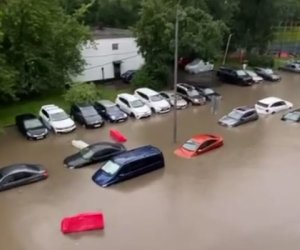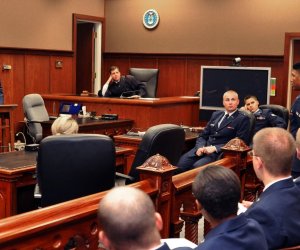Aurora hunters: The people who chase the Northern Lights - PHOTO

A hunt can start with a late-night text message from Alaska for Val Chalmers. A tip-off from a fellow enthusiast that good auroral activity might be heading her way. A warm bed and sleep are swapped for hours standing in shallow shore waters or perched on a cliff, often in freezing temperatures. The reward, if she's very lucky, is one of nature's most glorious displays - the aurora borealis, otherwise known as the Northern Lights.The nurse from Wick in northern Scotland is an aurora hunter, one of a very dedicated group. For them seeing the Northern Lights is not a one-off magical experience - it dominates daily life. If it's dark they are out scouring the skies and if it's day they are scouring up-to-the-minute meteorological data to try to predict when they might next catch the notoriously unpredictable and elusive aurora borealis. Equipment, cameras and warm clothes remain packed and ready as a call to action can come at any time. Clouds are their enemy, threatening to obscure the sky and ruin the party at any time.Continue reading the main storySearching for the aurora"I can be out several nights a week and I'll get up and go at any time, even the early hours," says Chalmers. "I might get a text and I'm out of bed and off. I've been known to stay out for 12 hours on occasion. I get a few lectures off family about clambering around the countryside in the middle of the night but it's my way of relaxing. Seeing the lights is just magical, they can make me dance around the place or shout out loud with delight. Some people might think we're a bit odd but I don't think much can competed with watching what goes on up in the sky, definitely not television."The aurora borealis occurs as a result of energy released by solar magnetic fields which eject large quantities of charged particles at high speed from the Sun. It can reach Earth in 24 to 72 hours and, if conditions are right, the electrons and protons flow along the Earth's magnetic field to the polar regions where they interact with oxygen and nitrogen to produce a magical red, green and purple dancing light show in the night sky.Northern Scotland is aurora-hunting country. It is the best place in the UK to see the lights due to its northern location and there is little light pollution as it is sparsely populated compared to much of the country. Part of the challenge for hunters is to find the darkest locations possible so they can see the brightest skies. It can mean scrambling about in the most remote, inhospitable terrain."Finding new spots is part of the excitement," says carpenter Barry Stewart, who lived in Wick until recently. "We're always scouting for locations and they're not necessarily easy to find or to reach, especially at night."Hunting the Northern Lights is pure escapism for me, a way to tune out from what's gone on in the day. They are addictive, there is a compulsion to see more and more. We get compared to tornado chasers in the US and it is that same sort of obsession. It's exciting, you get a real high from it."Seeing the Northern Lights requires a complicated combination of events to occur. Some of the required parameters can change by the minute, says Gordon Mackie, from Thurso and chairman of the Caithness Astronomy Group."Part of the appeal is definitely the thrill of the chase because there is never a guarantee that you will see the Northern Lights. There is a real challenge in understanding when they might be visible. You always require a degree of luck as well but when things go your way the sense of achievement is huge."Meteorological data is religiously monitored by the hunters using an array of websites and smartphone apps. Specialist subscription services also send out alerts with up-to-the-minute information.Hunters avidly track the Kp index, which relates to the intensity of interaction between the solar wind and the Earth's magnetic field in a horizontal plane. It is ranked on a scale of zero to nine, the higher the value the more the aurora can be seen at southerly latitudes. In late February spectacular Northern Light displays were seen as far south as Norfolk and Essex, making headline news because it is so rare. Kp levels of nearly seven were reported at the time.Maciej Winiarczyk gets Kp alerts on his mobile phone every 15 minutes. The structural engineer from Wick has been aurora hunting for three years. For him, like many others, his obsession is photographing the light shows. He has already captured thousands of incredible images but still goes out several nights a week and methodically sets up his equipment as if it were his first shoot."I climb hills and scramble down to a remote beaches, anywhere to get a good photo. I must have seen the Northern Lights about 50 times and every time still feels like the first. No two shows are the same but each one is perfection."He also uses time-lapse photograph to produce short films some of which have been viewed nearly 350,000 times on YouTube. Thurso cinema even asked to screen them alongside the usual offering of Hollywood blockbusters.It's an indication of the growing interest in the aurora borealis, say the hunters. Social networking sites where they avidly share information and photographs are getting increasing numbers of visitors. They're keen to share the love."We want people to know what they can see in the skies here," says Michael Beales, a government worker from Wick. "We post pictures on Facebook and people don't believe they were taken in this country. That's changing now and it's great."A few years ago they'd only be a few of us out there night after night, now more and more people are turning up. They might just be inquisitive but that's how most of us started, thinking we'd come out for a night or two and just see what all the fuss is about. Look at us now."(BBC)ANN.Az
Latest news 
More news 



































 Photo
Photo 



 Video
Video 

